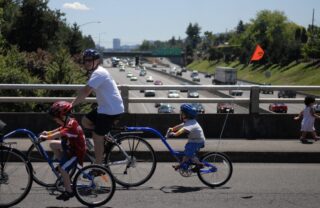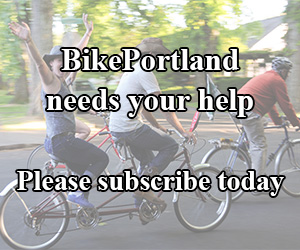Cycling News & Blog Articles
Spending showdown looms at final meeting of state transportation committee

For whom the bills toll.
(Photo: Jonathan Maus/BikePortland)
Like dreaded vegetables on a dinner plate, the powerful Joint Transportation Committee of the Oregon legislature has left the hardest stuff to swallow until the very end. At their last meeting of the session Thursday morning, committee members are likely to vote on consequential legislation that would set funding levels for three freeway projects and a plan to allow the state to borrow up to $600 million in tolling-backed bonds.
Months of debate have focused on two bills in the House: 3055 and 3065. Both are omnibus bills (meaning they deal with many issues) and look to tweak House Bill 2017, the landmark $5.2 billion package of project earmarks and new taxes the legislature passed in 2017. Among other things, HB 2017 set aside $30 million per year for the I-5 Rose Quarter project (to begin January 2022) and it directed the Oregon Transportation Commission (the governor-appointed body that manages the Oregon Department of Transportation) to study and implement tolls on sections of I-5 and I-205 in the Portland region.
Advertisement
House Bill 3055’s 109-pages address everything from the disabled placard program to a tweak to the definition of bicycle. It also includes an important section on changes to the state’s congestion pricing/tolling policies. Early versions of the bill clearly showed ODOT’s intent to change the intention of HB 2017 away from demand management and toward revenue generation. It would have changed the name of the program from “value pricing” to “tolling” and the fund from “congestion relief fund” to “toll program fund.” Concerns around these changes were captured by veteran transit advocate and retired TriMet employee Doug Allen in testimony submitted to the Joint Transportation Committee on March 15th:
Tolling cannot serve two masters. If it is to pay for bonded construction projects, tolls will be high, be in effect all day, cause inefficient utilization of highway capacity, and cause diversion. Public acceptance of these high tolls seems dubious. The revenue is unavailable for transit and safety projects on adjacent roadways.
If tolls are designed to solve congestion, they can be much lower, meaning that they are more equitable for low income travelers. They can be reduced to zero outside the peak. Revenue can be used to construct sidewalks, transit lanes, bicycle lanes, safe pedestrian crossings, etc. Public acceptance is much more likely. Highway capacity is efficiently utilized.
This tension — between using pricing to change behaviors versus using it to raise money to build more freeways — still exists; but because of strong pushback from advocates and regional government stakeholders, the bill language has changed for the better.
HB 3065 raised eyebrows when it emerged in March due to its chief backer, House Speaker Tina Kotek. It seeks to fund a pricing/tolling program, issue bonds off the proceeds to create new project revenue, and spread that $30 million per year for I-5 Rose Quarter to two other regional freeway projects: I-205 Stafford Road to OR-213 and the I-5 Boone Bridge and Seismic Improvement.
Initial versions of HB 3065 raised considerable ire due to what many thought was a blatant attempt to use tolling to build more, wider freeways. The bill was strongly opposed by groups as varied as No More Freeways (who called it “Tina Kotek’s highway widening slush fund”) and the City of Portland Bureau of Transportation, who issued a press release laying out their concerns. This pushback has led to amendments that sources say has improved the language (and its potential outcomes), but the bill is still a source of consternation for anti-freeway advocates because of its intention to direct money toward projects that will encourage more driving. Among its provisions is language that would allow ODOT to increase its borrowing limit to pay for freeway projects (via tolling bonds) from $100 to $600 million.
Despite the end of the legislative session looming and time running out at the Joint Transportation Committee, much of the dust on these two bills has yet to settle. Traditional tensions around distrust of ODOT and status-quo-beholden lawmakers loom. And the split between groups who see pricing as a tool to manage demand and fund active transportation projects and/or orphan highway updates, versus those who think the only solution to “bottlenecks” is a wider bottle, remain.
Today’s work session starts at 8:00 am. Find details of the meeting and a link to the video here.
Stay tuned.
[For excellent background on HB 3065, read coverage from The Oregonian.]
— Jonathan Maus: (503) 706-8804, @jonathan_maus on Twitter and This email address is being protected from spambots. You need JavaScript enabled to view it.
— Get our headlines delivered to your inbox.
— Support this independent community media outlet with a one-time contribution or monthly subscription.


